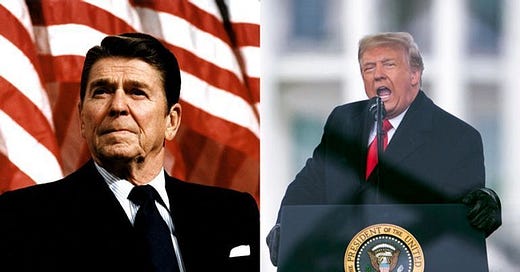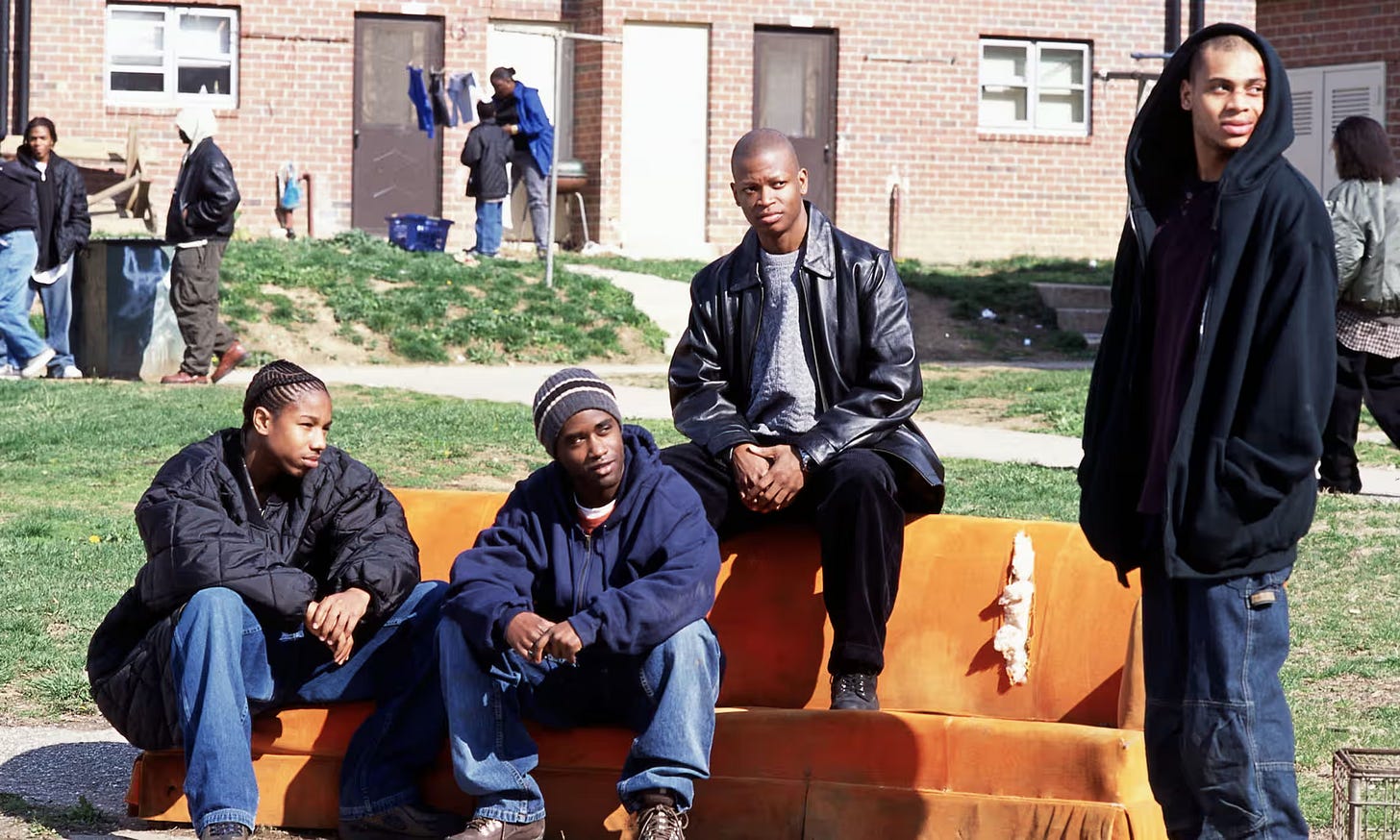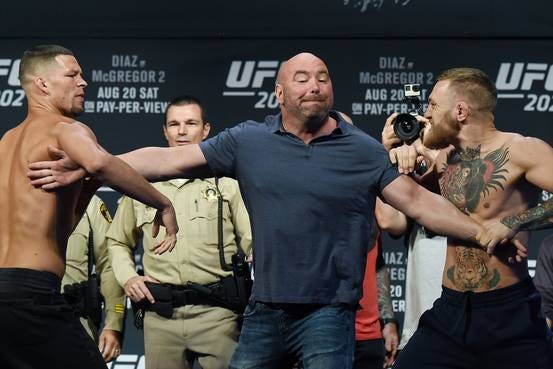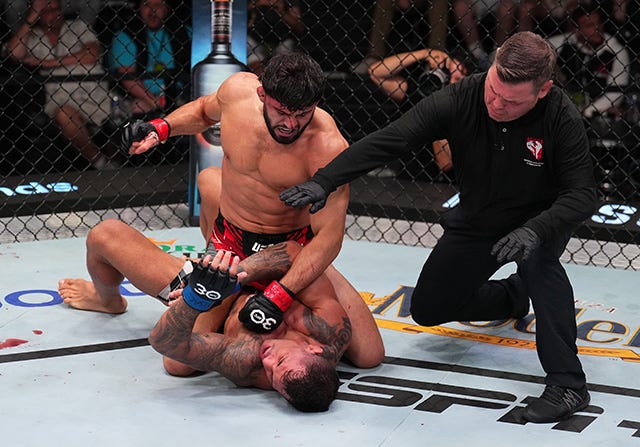Reagan's 1980 GOP > Trump's 2025 GOP
Perspective on the 40+ year transformation; Q and A with longtime Simi Valley, CA Reagan Foundation leader John Heubusch; The Wire and UFC as metaphors for Trump's GOP ascension
For my first D.C. Field Notes post of 2025 I’ll delve into the GOP's 40+ year transition from Ronald Reagan to Donald Trump. To help shed light on this topic after a few front-end reflections, I conducted a brief Q and A last week with John Heubusch -- a longtime director of the Ronald Reagan Presidential Foundation in Simi Valley CA.
Besides being a former ‘95-’96 National Republican Senatorial Committee (NRSC) colleague and all around brilliant, cool dude, Heubusch (pronounced High-bush) is a former Gateway Computer executive; Chief of Staff to Elizabeth Dole at the DoL, Air Force research analyst, and Simon and Schuster-published author, among other things. And, like me in 1980, he was a young person in D.C. trying to make something happen.
In the big picture, Donald Trump's inauguration as 47th President of the United States represents the final act in the four-decade transition from Ronald Reagan’s GOP to that of Donald Trump. For those of us here since the dawn of the Reagan era -- both working campaigns outside the Beltway and watching governance from a Capitol Hill vantage point -- it's been fascinating, to say the least.
First things first about Donald Trump: Debating all things Trump from a frame of good versus evil is monotonous and zero-sum. There's an entire cottage industry devoted to the topic. Rant, rave and remonstrate to your heart’s content — it’s a free country.
But far more interesting is the 2025 reality -- and how Trump has become, in Politico co-founder John Harris's words, "a force of history."
As Harris posted on Politico the other day:
He is not a fluke, who got elected initially in 2016 almost entirely because of the infirmities of his opponent. He is not someone the American public somehow misunderstands — as though Democrats and the news media have not spent 10 years forcefully highlighting the risks of his record and character.
He is someone with an ability to perceive opportunities that most politicians do not and forge powerful, sustained connections with large swaths of people in ways that no contemporary can match. In other words: He is a force of history.
This is something his most ardent supporters — still shy of a national majority — have never doubted but something others, me included, have been slow to reckon with. The inaugural address and a raft of hundreds of executive orders Trump has promised for his opening days in office make it impossible to avoid.
Besides the fact Trump marginalized Beltway GOP consultant-types like me in 2015-'16 by revolutionizing political communications using Twitter, he made a mockery of the standard "stay on message" and "avoid making unintended 'new' news" tactical media guidelines which, if correctly executed, mostly worked in debates, media, and TV appearances. Trump's first-person Twitter tirades and flood-the-zone, attack-oriented communications technique was foundational to wiping out the arguably high-quality field of 2016 GOP presidential aspirants.
At the time, I was doing some work for WI Governor Scott Walker -- a highly regarded, competent governor who grasped politics and policy as well as anyone in the then-GOP. Unfortunately, we were the first major candidate to leave the contest -- failing to even earn a memorable putdown moniker from Trump.
Not so for ongoing Trump combatants, "Low energy Jeb", "Lyin' Ted”, “L'il Marco" and all the rest. The brash New Yorker systematically dismantled the field -- one by one -- in ruthless, unprecedented fashion. Even Sen. Ted Cruz's wife was fair game as a target in the Trump attack playbook.
After Trump mowed down the entire GOP primary field, I ran into a few other vanquished candidates’ consultants at a downtown DC watering hole. We remained mesmerized how the strategies and tactics that had previously worked melted in the face of Trump's blowtorch onslaught.
“The Wire” as metaphor for Trump crushing the GOP field
A provocative metaphor kicked around at the bar likened Trump to Marlo Stansfield, the cold-blooded drug kingpin in The Wire.
Marlo and his murderous, take-no-prisoners cohorts wiped out Avon Barksdale -- the long-established ruler of the west Baltimore drug trade. How? Sheer ruthlessness, cunning and deep-sixing what was then -- even among drug lords -- established rules and protocol.
Barksdale’s gang was vicious, but they adhered to precedent and a code of conduct -- basics like keeping your word on the street, and not putting an actively-targeted street rival’s mother in the line of fire as he escorted her to Sunday worship.
Marlo’s crew? No rules. No code. They pursued their objectives by any means necessary — usurping the entire Baltimore drug trade and dropping bodies in record numbers.
The Wire metaphor is a bit overwrought, and alcohol induced.
But Trump’s 2016 GOP triumph was a seminal, historic development in the incremental transition from Reaganism to Trumpism— and how campaigns were waged. After the drinks and bonhomie, we disbanded with ersatz certitude Trump would be the underdog against Hillary Clinton -- and most likely lose.
Wrong.
The Reagan Foundation’s John Heubusch offers insight into how Trump KO'd the GOP field in this brief, lightly edited Q and A in which he compares traditional boxing to the Ultimate Fighting Championship (UFC) juggernaut and its founder, Dana White.
GH: Let's take as a given that Trump's rise to power in 2016 amounted to a hostile takeover of the GOP. As you saw things unfold during the Reagan Foundation's infamous 2016 debate -- and more broadly during the many Simi Valley forums you sponsored -- how was Trump able to so methodically wipe out the 2016 GOP field?
JH: The Wire discussion is interesting -- but I have a different metaphor -- which involves how today’s UFC supplanted traditional professional boxing. In professional boxing, you played by the so-called Marquess of Queensberry rules. If you floor your opponent, you go to a neutral corner to wait for the ref's 10 count to give the opponent time to clear his head; if your opponent takes a knee, you can't continue to punch -- and so forth.
There were accepted rules and a code of conduct. I basically equate this with the entire Reagan Republican Party era. While tough, highly negative campaigns were always an accepted part of the game, Reagan's "Thou shalt speak no ill of a fellow Republican" mantra remained a general, overarching intra-party guideline.
So along comes Dana White -- today, no surprise, a very close friend of Trump's -- who helped establish what we see today as mixed martial arts and the Ultimate Fighting Championship (UFC). While there's indeed a referee, there are no neutral corners. The gloves are minimally padded -- virtually bare-knuckle -- increasing the likelihood of cuts and quicker knockouts. You fight in a ring resembling a cage. There's no escape.
The action proceeds until one fighter 'taps out' to avoid losing consciousness — or worse. It’s brutal, enormously popular, fans love it, and its far supplanted traditional boxing in terms of gross earnings, pay per view (PPV) sales, and the like.
You see where I'm going: the old GOP model has been transformed and modernized by Donald Trump in a campaign game where -- like the UFC -- brutality and decimating your opponents can take you across the finish line as the winner. And the brutality extends to punishing, humiliating and running the Democratic opponent into the ground.
No surprise, Republicans love it, with a battalion of select supportive media, podcasts and others marching lockstep behind the conqueror.
Do you believe Trump saw this coming all along, or did he simply absorb and implement the unfolding 21st century political zeitgeist?
Trump's a big UFC fan -- and it's easy to see why. Like Dana White, Trump saw before any other Republican the emergence of UFC-like politics where the rules had changed entirely. Correspondingly, the public was catching on in droves after initially wanting nothing to do with it in their towns, cities and local communities -- much like Donald Trump as he entered the GOP gladiatorial fray riding down that gold Trump Tower escalator into battle. That's all been turned on its head and the UFC and Donald Trump are on top.
I'm not saying Trump looked at the UFC and decided to fashion his political approach in a similar way. I'm saying that Trump has proven to be highly observant and opportunistic in terms of America's cultural and political trends and terrains -- and spotting and exploiting weaknesses in his opponents.
A superior political athlete, Trump's approach to politics has corresponded with the increasingly visceral nature of social discourse and Americans' growing skepticism of politicians, elites, so-called "experts" and the same old B.S. and incompetence from Washington. Reagan's appeal in his time -- sans the name-calling and bridge burning -- was somewhat similar.
Yet, Trump's appeal in this context is on steroids.
Trump seemed to delight in going after Jeb Bush in the 2016 primary. Do you believe Trump saw him as just another professional politician at a podium who needed to be pushed aside or something more?
Jeb Bush in my mind was a fat target for Trump given his family's dynasty. But I believe he was simply collateral damage in Trump's broader mission to dismantle that whole lineage of traditional "country club Republicans" -- whom he viewed as weak -- always playing not to lose.
And yeah, Jeb was the front-runner who had to be taken out -- so that's what he did. As for the Bush's and their brand -- the gold standard in the 'old GOP' post-Reagan -- I don't think it was personal. Trump wanted to win, and the Bush dynasty in the form of Jeb was simply in the way.
Fast-forward to today -- there’s surely no love lost between Trump and the Bush family. You had to notice that George W. Bush snubbed greeting Donald and Melania Trump at the Jimmy Carter memorial service a few weeks back.
I know plenty of D.C. Republicans hoping the post-Trump party will revert to a style more akin to Reagan and Bush. Is that even possible?
Not going to happen. Time moves on. I've stood in front of huge crowds at the Reagan Library, and 40 years post-presidency they're all as respectful and admiring of his legacy as you can imagine. They cherish Ronald Reagan in their heart. Mention his name, you get tremendous applause.
In 2017, within just a few months of Trump taking office, speakers who came to the Reagan Library and referenced something Trump had done -- or mentioned his name -- he'd get the same ovation.
I was amazed how quickly Republicans who'd been hard-core Reaganites shifted -- or, rather -- transferred their allegiance. That's not to say they didn't still love and admire Reagan -- like we all do. But they found the closest thing they'd seen to Reagan in their lifetimes -- not in style, but in his capability to unify the party, stick with a few big themes, and win.
Having spent so much time working at the Foundation -- and really feeling the pulse of what President Reagan brought to the table -- people will always admire him for his resolve, who he was, and what he was able to accomplish. But these same folks -- and many now younger -- feel they have a modern-day Reagan, albeit with a very different style and approach.
They have no interest in turning back. Honor one, back the other.









The statement "Trump's broader mission to dismantle that whole lineage of traditional "country club Republicans" -- whom he viewed as weak -- always playing not to lose" is so spot on and got me out of my chair fist pumping. The point of comparison about relentless resolve between Reagan and Trump is what separates the two of them from every single Republican president and candidate since perhaps Eisenhower. The RINOs don't get any of this, and your article and interview are a Grand Slam game winning homerun!!!
Thank you